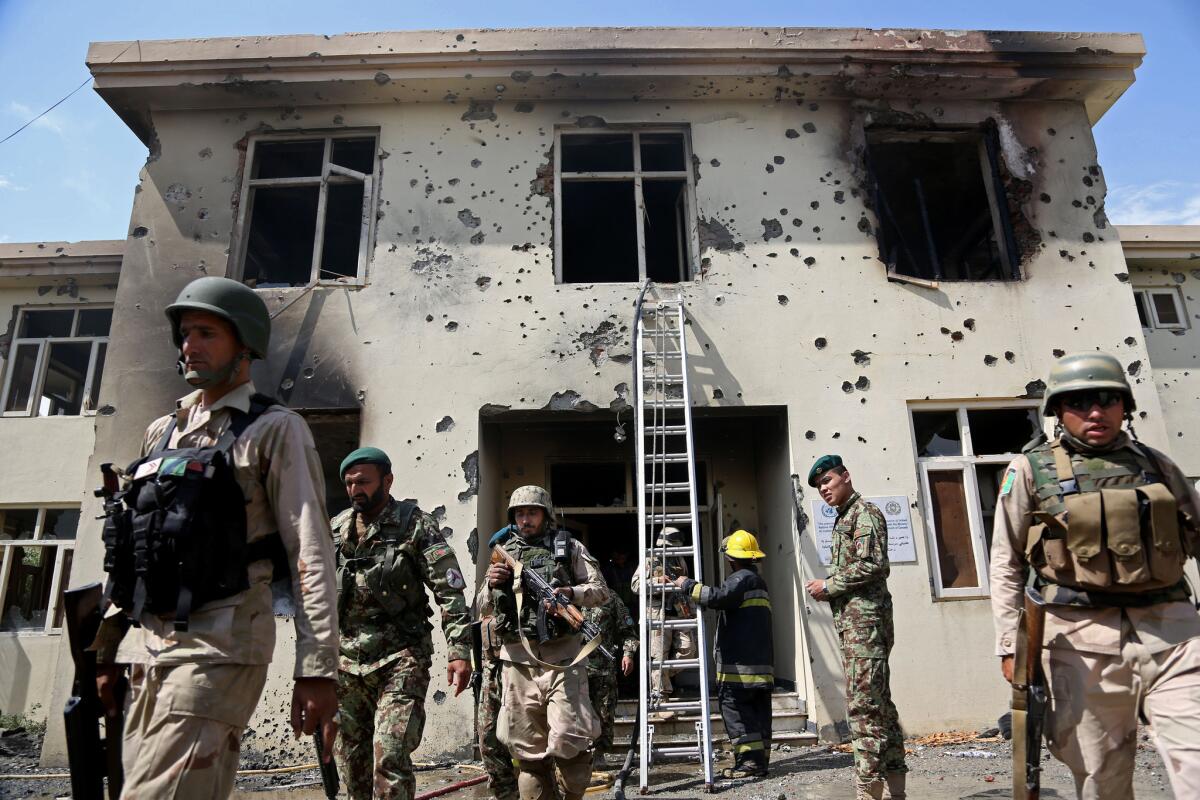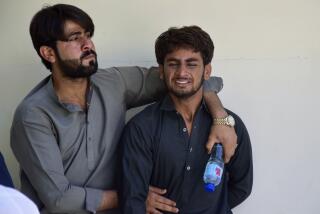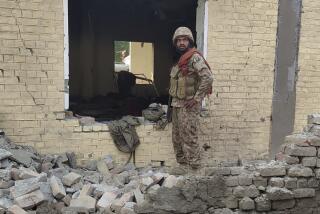At least 13 killed as Taliban launches spring offensive in Afghanistan

- Share via
Reporting from Kabul, Afghanistan — Taliban assailants stormed a government complex in eastern Afghanistan and raided police checkpoints on Monday in a series of attacks that killed at least 13 people and marked the start of what the insurgent group dubbed a new spring offensive.
Militants also fired two rockets at Kabul International Airport, causing no casualties but underscoring the country’s fragile security even as it awaits the results of last month’s presidential election and the United States continues to withdraw its forces.
Fighting between the Taliban and government forces and their NATO allies typically increases in the spring as the weather improves and snow melts. But this year will the toughest test yet for Afghan soldiers and police, who are now completely in charge of security operations as NATO forces including the remaining 30,000 U.S. troops – the lowest number in six years – accelerate their withdrawal.
The Taliban announced last week that it would begin a new offensive on May 12. The deadliest attack occurred in the eastern city of Jalalabad, where three militants dressed in police uniforms struck a compound housing the provincial justice department and engaged in a three-hour gun battle with Afghan security forces.
One assailant set off his explosive vest at the entrance, clearing the way for the others to get in, said Hazrat Hussain Mashriqiwal, a spokesman for the Nangarhar provincial police department. Five justice department employees and two police officers were killed, Mashriqiwal said. The other two attackers were shot and killed by police.
Seven other people were wounded in the incident, Mashriqiwal said.
The Taliban also claimed responsibility for two raids on police checkpoints. In southern Helmand province, officials said that three police officers were killed in the volatile Sangin district, where U.S. Marines suffered heavy casualties in recent years trying to rid the area of insurgents. The last Marines stationed in Sangin pulled out last week.
In another restive area, the eastern city of Ghazni, provincial officials said that militants unleashed gunfire and mortar rounds on police checkpoints, including some near civilian homes. One police officer and two women were killed and at least eight others were injured, including three children.
The ongoing violence has undermined a generally successful election held last month to determine the successor to President Hamid Karzai, who is constitutionally barred from seeking a third term. The top vote-getter from a field of eight, former Foreign Minister Abdullah Abdullah, in recent days has received endorsements from two candidates who finished far behind him, giving him momentum heading into a likely run-off election against the second-place finisher, former Finance Minister Ashraf Ghani.
Both candidates have pledged to sign a security agreement that would keep a few thousand U.S. troops in Afghanistan beyond 2014 in a limited training and counter-terrorism role.
But there are growing signs that the withdrawal of most international troops is emboldening the Taliban, experts say. Although the insurgents failed to derail the first-round election on April 5 amid a heavy Afghan security presence in urban areas, the Taliban demonstrated its prowess in rural areas of eastern and southern Afghanistan by launching small-scale attacks and threatening voters, many of whom did not cast ballots out of fear. The second round of voting is still unscheduled but expected next month.
The International Crisis Group, a research agency, said in a report released Monday that insurgents in 2013 inflicted nearly as many casualties on Afghan forces as they suffered themselves, and that accounts of fighting in some remote areas indicated that the two sides were almost evenly matched in terms of manpower.
“The overall trend is one of escalating violence and insurgent attacks,” the group said. “Ongoing withdrawals of international soldiers have generally coincided with a deterioration of Kabul’s reach in outlying districts.”
Special correspondent Baktash reported from Kabul and Times staff writer Bengali from Mumbai, India.
More to Read
Sign up for Essential California
The most important California stories and recommendations in your inbox every morning.
You may occasionally receive promotional content from the Los Angeles Times.











